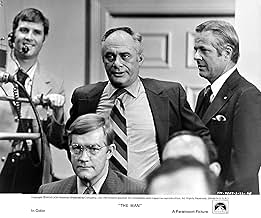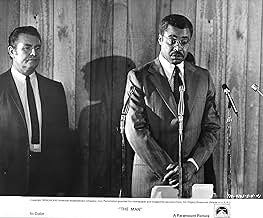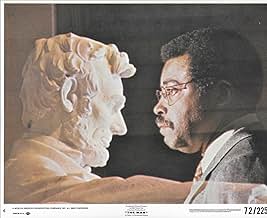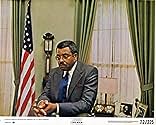अपनी भाषा में प्लॉट जोड़ेंAfrican American senator Douglas Dillman becomes designated survivor of a tragic accident that kills the U. S. President. Eventually, Dillman becomes the first black U. S. President and atte... सभी पढ़ेंAfrican American senator Douglas Dillman becomes designated survivor of a tragic accident that kills the U. S. President. Eventually, Dillman becomes the first black U. S. President and attempts to end the bigotry standing in his way.African American senator Douglas Dillman becomes designated survivor of a tragic accident that kills the U. S. President. Eventually, Dillman becomes the first black U. S. President and attempts to end the bigotry standing in his way.
- पुरस्कार
- कुल 1 नामांकन
- Wheeler's Lawyer
- (as Martin Brooks)
फ़ीचर्ड समीक्षाएं
Enter US Senator Douglass Dillman, who is president pro tempe of the senate. He is also black. He accepts the presidency to the discontent of many cabinet officials, especially the secretary of state. He would be president if not for Dillman.
Racial feelings are revealed among several politicians as Dillman sits in the oval office, determined to overcome the bigotry of those around him and to be as good a president as he can be.
An early vehicle for James Earl Jones, who as Dillman, is brilliant. Excellent performances by the supporting cast. Hopefully, this film will one day be on DVD or VHS. It's also a good potential historical lesson to be absorbed by Americans if this situation should ever happen.
In the opening scene, a White House breakfast is in progress even though the President and the Speaker of the House are visiting a mediaeval cathedral in Europe. Suddenly news arrives that the cathedral has collapsed: the President and the Speaker are dead. White House aides inform Vice President Calvin (a good performance by Lew Ayres) that he's now the chief executive. But Calvin is old and frail, and he refuses the job. I found this contrived: if the Vice President isn't medically fit to replace the President at an instant's notice, then he isn't fit to be Vice President and shouldn't hold the office.
By an obscure but apparently genuine constitutional fluke, the Presidential succession devolves to an obscure senator named Douglass Dilman (James Earl Jones) who happens to be Negro. Yes, a black man is now President!
"The Man" raises some interesting issues. Jones gives an intelligent and dignified performance as the black President who refuses to see his job promotion as proof of racial progress. He knows he wasn't *elected* to the job, and he doesn't believe that America will elect a black President any time soon. (This was 1972.)
William Windom, who usually played sympathetic roles, gives an excellent performance as a bigoted white politician who covets the Presidency. (The posters for this movie depicted Windom speaking a racial epithet.) Charles Lampkin is excellent in a small role as a black Congressman. And, of course, now that a black man is in the Oval Office, there's a plot to assassinate him...
For some reason, comedian Jack Benny gets very large billing for a very brief scene in "The Man". He appears only in the opening teaser sequence: when the opening credits roll with Benny's name on the screen, we've already seen his entire performance and he won't show up again! Playing himself, Jack Benny performs a comedy monologue during the White House breakfast. But Benny's legendary timing is off, and he doesn't bother to conceal that he's reading his jokes off a legal pad. I'm a Jack Benny fan, but he disgraces himself here.
There are some good scenes in "The Man" but there's a lot of sermonising too, and very little action. I recommend this film with reservations, and I'll give it 5 points out of 10. I sincerely believe that the U.S.A. will eventually elect a black President ... but, sad to say, I also believe that the first African-American President will almost certainly be assassinated. I hope I'm wrong.
Yet.
It's obvious ABC got a higher quality product than they wanted. The Movie of the Week series cranked out one piece of clichéd garbage after another during its 1969-1976 run, and the occasional brilliance (That Certain Summer, Katherine, Duel come to mind) would catch everyone by surprise.
What do you do with something good, when you're regularly paying for crap?
Sheesh, people might begin to expect quality.
So, ABC puts The Man into limited release. The movie looks like a TV flick because it's on a MOTW budget. Probably made $37.26 nationwide. That'll teach 'em to make something good!
But.
I'd put The Man in the box set of post-Twilight Zone Rod Serling work along with the white-knuckled Seven Days in May, the original Planet of the Apes, and some of the better episodes of The Night Gallery. Serling was a great writer, but the trouble with The Man is that it's so starved for time and funds, so shoestrung by lowest common denominatorism from the network, that the movie never gels.
That's catastrophic for the viewer and mundane for the world of networkthink.
When the POTUS, the Speaker of the House, and others are killed in a very unfortunate accident, and the VP declines being sworn in due to his health, the next in line for the presidency became Senator Douglas Dilman (James Earl Jones). The initial thought was that the Secretary of State would be the next in line, but due to the Succession Act of 1947 the hierarchy was the President, Vice President, Speaker of the House, then President Pro Tempore of the Senate. This thrust a Black man into the presidency for the first time in U.S. history.
Naturally, the implications, expectations, and non-expectations were tremendous. This movie could've gone in almost any direction and that's what we were waiting for as viewers: to see what direction it would go.
The plot thickened as did the agendas once Dilman was sworn in. I think we only got a small taste of both the positive and negative expectations placed upon Dilman by Blacks and Whites. The movie settled in on one hot button issue surrounding the apartheid country of South Africa. It was an intricate hot mess President Dilman had to deal with. He was in a most unenviable position and I think the film (and Jones) conveyed that well.
This was a bold and brave movie for 1972. The dialogue was excellent as was the script. I only wonder if Obama ever watched this?
क्या आपको पता है
- ट्रिवियाJames Earl Jones was interviewed about portraying a fictional black U.S. president a few days before Barack Obama was sworn in as President. Jones said that he had misgivings about the film, mostly because they were blindsided when the project (which was planned and budgeted as a TV movie) was released in theaters, and he wished that they'd had more time and resources to make a stronger final film.
- भाव
Douglass Dilman: We live in a time when violence is offered up as the panacea. The bullet seems to be the final instrument of political discourse. Men die violently, we bury them, we mourn for them and we seek retribution. It's a deadly pattern... a quote from Genesis: "Behold the dreamer. Come now therefore and let us slay him and we shall see what has become of his dream." We cannot murder the tyranny by murdering the tyrant and we cannot murder the dream by murdering the dreamer. And if we justify the taking of any life in the name of our morality, we've done nothing but murder our morality.
- कनेक्शनFeatured in The Dick Cavett Show: 19 जुलाई 1972 को प्रसारित एपिसोड (1972)
टॉप पसंद
- How long is The Man?Alexa द्वारा संचालित
विवरण
- रिलीज़ की तारीख़
- कंट्री ऑफ़ ओरिजिन
- भाषा
- इस रूप में भी जाना जाता है
- ザ・マン~大統領の椅子~
- फ़िल्माने की जगहें
- उत्पादन कंपनियां
- IMDbPro पर और कंपनी क्रेडिट देखें






































